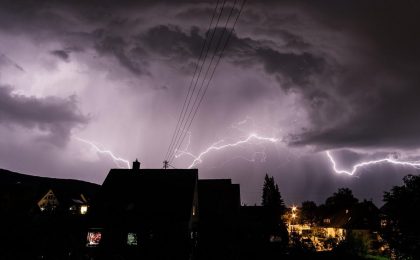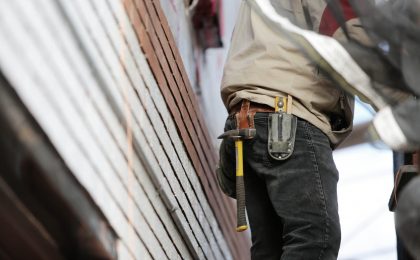Let’s hope you never file a Homeowners claim.
A homeowners policy is like a seat belt.
We use seat belts every day. They aren’t comfortable, they are one extra thing we have to do in the car, and they can choke us if we do have to use them. But they also work when we need them most, often saving our lives in the process.
A homeowners policy is like a seat belt. You pay for it even when you think you shouldn’t have to, either folded into your mortgage payment or on a monthly draft. You have to keep up with the paperwork, talk to your agent when you have something change, and it can get more expensive if your home goes up in value.
But, if lightning strikes – literally – and a fire destroys your roof, you’ll be extremely thankful that you have one.
So let’s talk about what happens when that something does happen, and you have to file a homeowners claim.

Was that the Johnson’s house?
Dealing with damage.
The first thing to do, as I mentioned in my blog on handling the claims process and winning, is to make sure that everyone is safe. If your eight year old daughter decides to put her favorite stuffed bunny in the toaster oven to “warm him up,” you might have a fire on your hands. If you do, use your fire extinguisher to try and put it out or at least minimize the damage. But if you can’t, and there is ever any doubt, exit safely – here’s how to exit with children. If you cannot contain a fire, or have other emergency situations in your home (flood, burglary, medical emergency, etc.), call 911 immediately and report it to the proper authorities.
Once the situation is safe and all danger has passed, assess the damage. Take pictures and document all that you can to make sure you can give your adjuster the information they need. You’ll want all the ammunition you can get to navigate a homeowners claim with confidence. Other than pictures, make lists of items that may have been destroyed or lost, find receipts or estimates of of damaged property, and organize your findings so that there isn’t any question of what was damaged due to the covered accident.

I think that’s the last of it.
Report it to your insurance company.
This part should be obvious – contact your insurance company as soon as possible. Let your agent and your company know – even though your agent can’t handle the entire claim for you, they can give you advice, help you with forms, and make sure you have the right contact information for your insurance company. A homeowners claim is a massive deal, and your agent will want to know what happened – especially that you are all right!
Soon your adjuster will be contacting you and coming by to assess the damage. Provide them with all of the documentation you worked so diligently to create earlier, and help them navigate the home, especially if there is substantial damage. Remember that your adjuster is the person who can help you the most during this process, so work with them and see them as an ally rather than an obstacle. It is their job to help you get back on your feet, and the right attitude can help both of you get to a successful conclusion.

Wow, that was easier than I thought.
Handling the repairs.
Whether you go with the companies that your insurance company recommends or someone you decide to hire yourself, make sure you keep track of what is going on and who is doing what. Sometimes the timing of repairs can be off, and you will have to pay for something to be fixed and wait for the insurance company to pay you back. Always check with them first to make sure that this is part of the process, as you don’t want to be surprised and find out that the repairs you ordered aren’t covered!
Again, proper communication with your adjuster and your agent should get you through this smoothly and in a timely manner. If you do hire your own contractors to do the repairs, make sure that they are licensed and bonded in your area, as this could be another stumbling block between you and your company. Not only that, but having your friend’s uncle’s cousin’s brother repair your roof could get you in big trouble if he falls off and you find out that he doesn’t have commercial insurance. Check with your company or your agent if you aren’t sure who to hire.

I’m glad I renewed my paperwork with the state or I wouldn’t have got this job!
Remember the three keys.
The three keys to handling a homeowners claim are safety, documentation, and communication. If you focus on these three things you will come out at the other end with repairs completed and a new sense of just what insurance is really all about.
Remember, this is why you have insurance in the first place – to get you back to where you were before something bad happened.
If you have questions about the claims process, or about homeowners insurance in general, please reach out and ask us anything. Fill out the form below and find out how Alliance Insurance can help you protect the things you love – because you never know what could happen.
